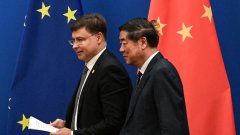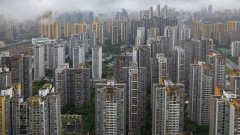
Tuesday to "restore and expand" consumption in a wide-ranging plan to bolster growth that includes boosting household income, improving business environment for private firms and stabilizing youth employment.
China's continued economic recovery is still faced with insufficient demand, weak momentum, and weak confidence, Jin Xiandong, an official with the National Development and Reform Commission, said Tuesday at the agency's monthly press conference in Beijing, according to a CNBC translation.
"Consumer purchasing power and expectations are relatively weak, while consumption infrastructure and environment need to be improved," Jin added.
On Monday, a raft of provided more basis for market watchers to renew to bolster growth. Chinese leaders have signaled in recent weeks they are likely to be in their policy support.
China's GDP for the second quarter grew 6.3% from a year ago, missing market expectations for 7.3%. It marked a 0.8% growth compared to the first quarter, and was slower than the 2.2% quarter-on-quarter pace recorded in the January to March period.
Even with a low base from last year, given the Covid lockdown in Shanghai, retail sales growth slowed to 3.1% in June from a year before, compared to 12.7% in May.
"We will promptly formulate and introduce policies to restore and expand consumption, and issue policies to stabilize large scale consumption, promote the consumption of automobile and electronic products, expand rural consumption, and optimize the consumption environment" Jin added.
"Effective policy measures will be implemented as soon as possible."
Within hours, Commerce Ministry followed with an announcement of an to boost the domestic consumption of household consumer goods and services.
This included a directive to local governments to step up the renovation of old homes, a pledge to encourage improvements to online commercial platforms, and to develop the concept of "15-minute cities."
The state planner also vowed to address record youth unemployment in China, which came in at 21.3% in June — almost four times the regular rate of urban unemployment at 5.2%.
In response to employment issues relating to particular groups such as college graduates, Jin said, the NDRC will "increase service and policy guarantees, step up support for job stabilization and expansion."
Jin said the NDRC will also work to help young people harness their innovative and entrepreneurial energy, strengthen employment services for youths and step up the development of vocational education so that college graduates are more employable.
The NDRC will also work to improve wages, ensuring that wage growth commensurate with economic growth.
Economists generally see reasonable wage growth as an important aspect of boosting consumer confidence and consequently, economic growth.
Another NDRC official Li Hui said the Chinese state planner will deepen the reform of state-owned enterprises, while removing institutional barriers to help private companies become more competitive.
The agency will also increase engagement with the private sector to better understand their needs and demands and evaluate policy effectiveness, she said.
Separately, Jin said the NDRC will step up efforts to attract foreign investment. They include improving communication with various foreign chambers of commerce to understand and resolving issues in a timely manner.
The pledge echoes , when he said China will "vigorously promote high-level opening up and better protect the rights and interests of foreign investors per the law."
This comes as amid an escalating global battle for technological supremacy.
Earlier in July, Beijing slapped export curbs on and its compounds — which China's Ministry of Commerce the U.S. and Europe advance notice. In October, the U.S. launched aimed at of key chips and semiconductor tools to China.




